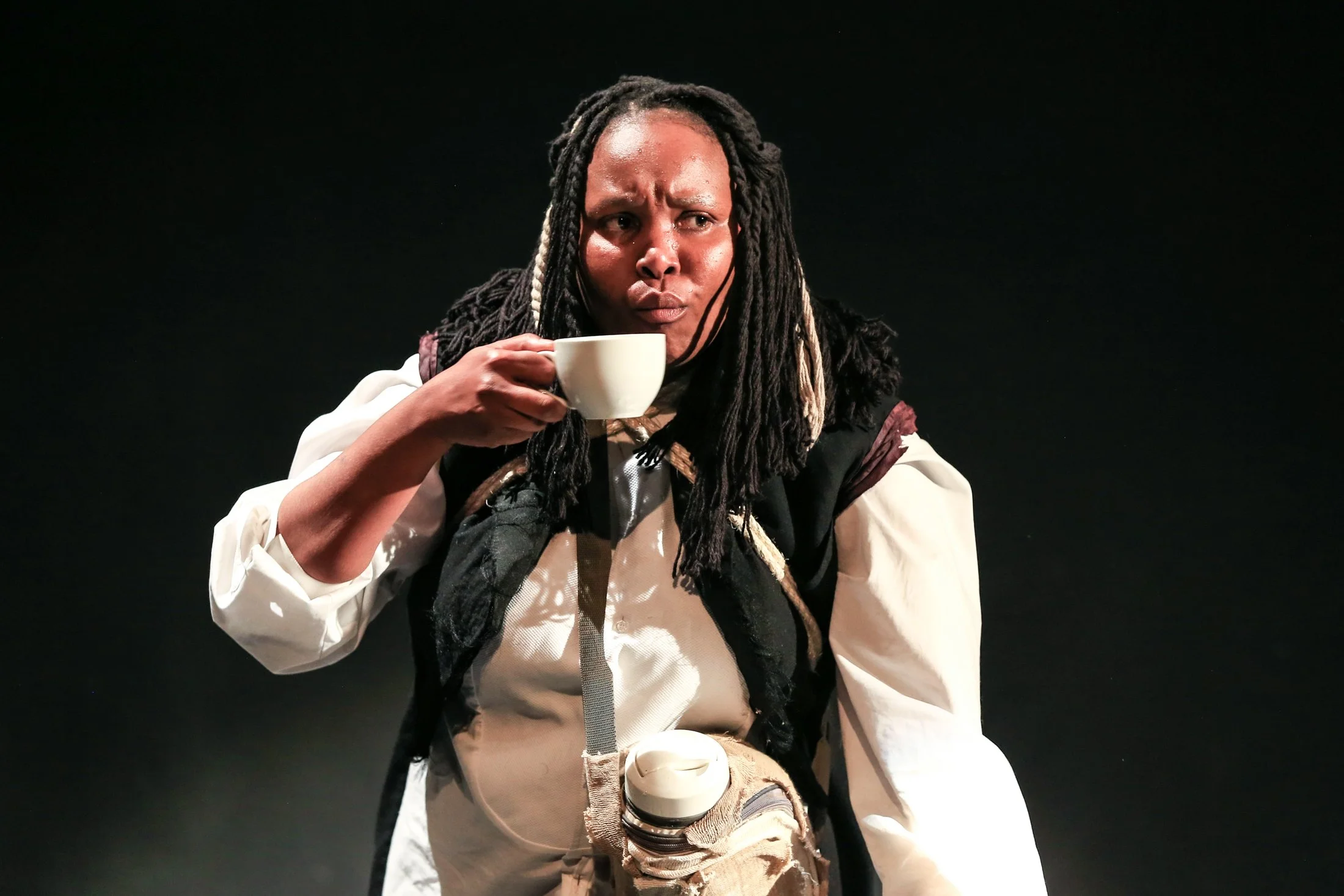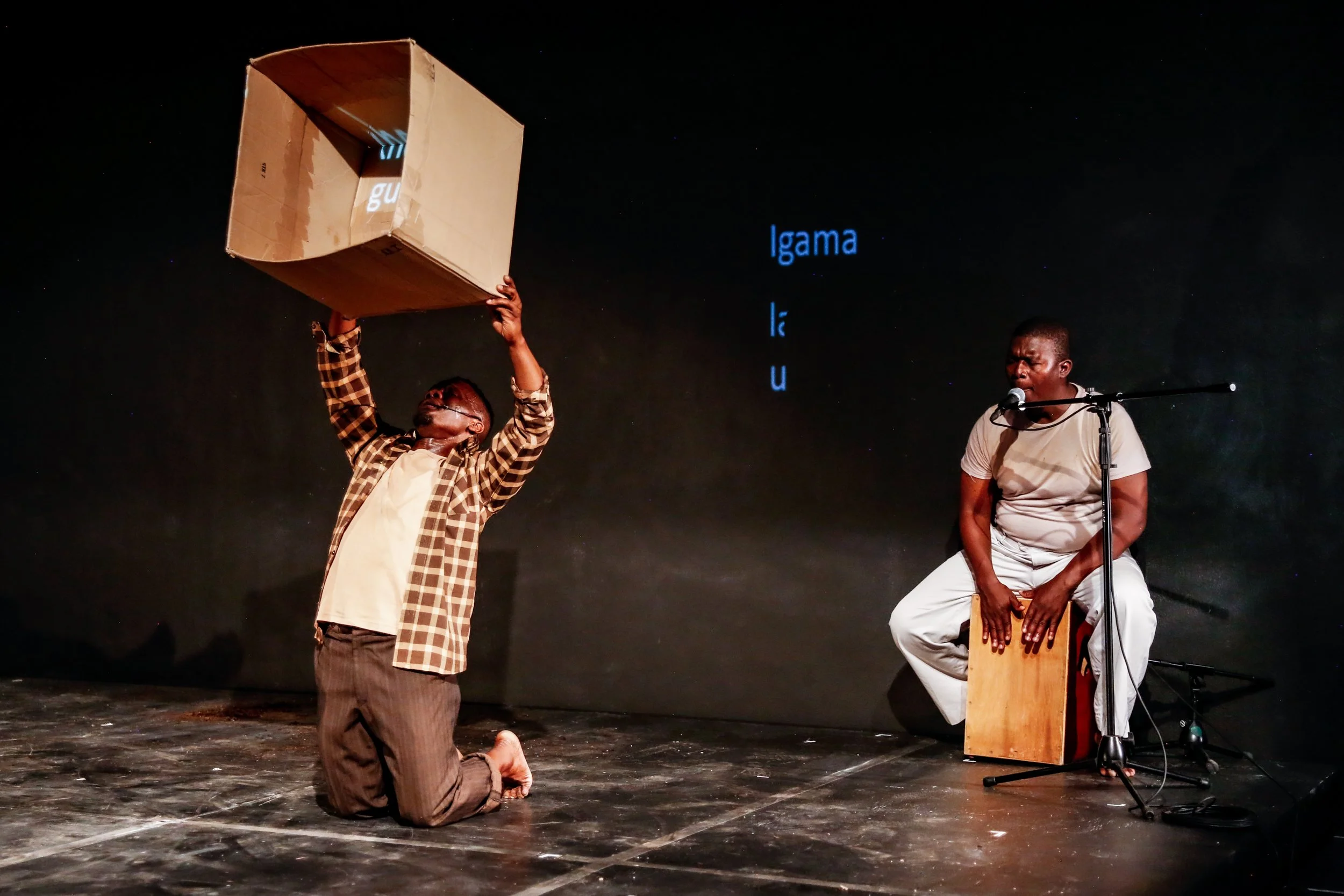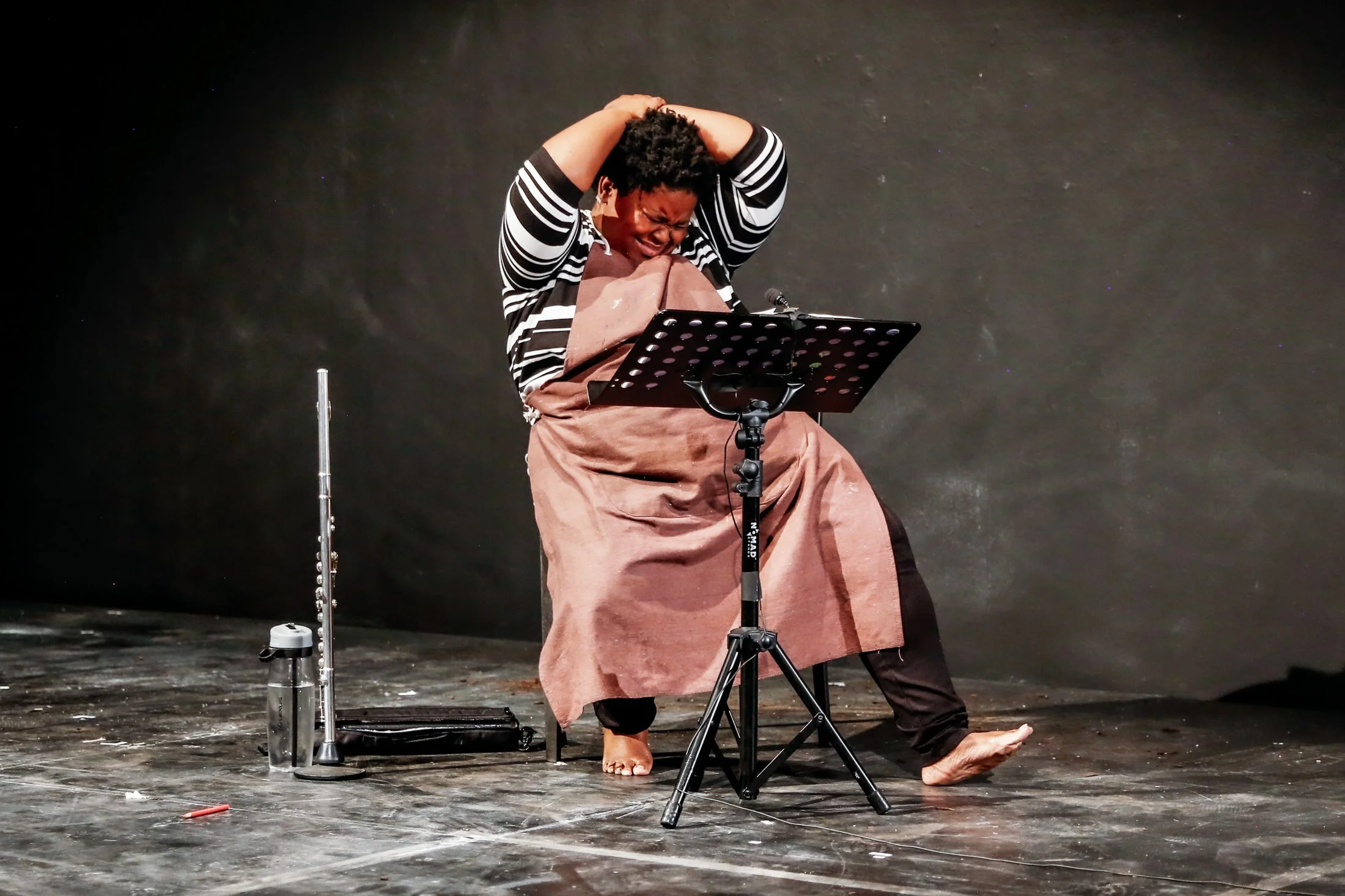MΕΤΆΦΡΑΣΗ OF IZINGUQULO | TRANSLATION OF TRANSLATIONS is a programme of playful, performative and sometimes profound translations of translations, translators, and codes of translation.
THE LAST LOST TRANSLATOR
She arrives late. One gets the sense that this is always the case – that she is never on time, never able to catch up with her growing list of responsibilities.
The Last Lost Translator, conceptualised and performed by Khutjo Green, deals with the anxiety and burden of translation. A series of objects are calling out to her and as The Translator, she must tend to all of them, listen to their messages, their ailments, their heavy histories and translate them to the rest of us.
The teacup speaks a language of pseudo-intellectualism, and the bucket of soil communicates in dreams and whispers. The pile of rope, seemingly innocuous, tells of endless necks and hands and ankles. But there is humour, too. Material and linguistic refrains from other Season 9 works are performed and parodied through a further layer of translation.
At the heart of The Last Lost Translator is an essential question: By constantly acknowledging and translating the inanimate, as well as that which is embedded and unseen, what traces does this leave on the translator? And what do we do with the remnants of translation?
– David Mann
CREDITS:
CONCEPTUALISER & PERFORMER | Khutjo Green
NDIGUYE ENDINGUYE
What do we lose when we ignore the meaning, cadence or inherent musicality of a name? The Xolisile Bongana-conceptualised Ndiguye Endinguye is both an attempt at reclaiming and reconnecting with one’s identity, and a performance-based inquiry into the multiplicity of meaning inherent in a name.
Ndiguye Endinguye essentially constructs a compelling narrative out of two sticks, a sheet and a cardboard box. A short-form theatre work merged with resounding musical performances, the sound, meaning and essence of a name are picked apart and explored through these respective modes of performance. Offstage and to the side, Anathi Conjwa, Zimbini Makwetu and Thabo Rapoo develop a layered and lyrical score to Bongwana’s sharp and symphonic choreography.
Rich and compelling moments of private joy – a duel between two action figures, playing soccer alone outside – are repeatedly disrupted, always drawing back to the name, Xolisile, and excavating a further layer of meaning. And herein lies the central refrain of Ndiguye Endinguye – your name is who you are.
– David Mann
CREDITS:
CONCEPTUALISER & PERFORMER | Xolisile Bongwana
MUSICIANS | Anathi Conjwa, Zimbini Makwetu & Thabo Rapoo
PROKOFIEV FLUTE SONATA IN D (OP. 94)
The stage is set, and she has all that she needs, but she cannot begin.
In Prokofiev Flute Sonata in D (Op. 94), there is music, but it refuses to be played. There is a performance, but it won’t begin in the ways we expect it to. Still, something stirs.
Through live, looped audio and the physical accumulation of preparation, Prokofiev Flute Sonata in D (Op. 94) builds on the activities and habits that precipitate a performance. It is the sip of water, the tutting, the clearing of the throat, the application of the lip balm, always on the edge of activity.
What develops is a performance of procrastination, a series of endless and recognisable gestures, folding in on themselves and culminating in a symphony of process. The music, that part ofthe performance we have been waiting for, reaches us in a different way. Ultimately, it is a translation of the score, through the habits and gestures of preparation and procrastination, that serves as the central act.
– David Mann
CREDIT:
CONCEPTUALISER & PERFORMER | Bongile Gorata Lecoge-Zulu
SOUND DESIGNER | Zain Vally
LA LA LA SO
They begin with the language of music, although nothing can be heard. Soon, a clear gesture emerges, followed by a steady rhythm and then a resounding, rallying musicality that breaches the stage and echoes through the venue.
La La La So, conceptualised by Season 9 co-curator Athena Mazarakis, takes a staple of the South African choral repertoire (Koloi Ena) and, through the use of the tonic sol-fa technique, translates lyrical and linguistic meaning from notes to gesture to playful musicality. Soon, the image of a broken down vehicle is evoked – a flailing and spluttering thing that refuses to move – and the message becomes clear: the wheels have come off.
The brief, but complex performance is one that resonates across language, gesture and translation to put forward a warning, or perhaps merely an observation, about the state of the country, the world, the present moment.
– David Mann
CREDITS:
PERFORMERS | Duduza Serenade, Bongile Gorata Lecoge-Zulu, Anathi Conjwa, , Thulisile Binda, Muzi Shili & Xolisile Bongwana
CONCEPTUALISER & DIRECTOR | Athena Mazarakis
LEPARA COSMOS
Lepara Cosmos merges live performance, music and immersive storytelling to put forward a tsotsitaal retelling of ǀ Xam cosmological narratives of the ǃXwe-nǁa-sʼo !ʼE (first seated people).
Spoken language, naturally, plays a central role in the performance, with Pule Welch and Khutjo Green delivering the epic tale through their engaging forms of narration. Neither supplementing nor leading, but rather working alongside the central narrative, the storied visuals of Lepara Cosmos are compelling. A character stands atop a mountain, the wind whipping the rocks beneath their feet while elsewhere rain falls through the night, lit only by the moon.
Light – its presence, its absence and its ability to produce a proliferation of shadows – merges with the spoken word, while a figure emerges from the soil and lends a musical quality to a scene. Altogether, these visual and performative vignettes form an edifying tribute to the story of the universe.
– David Mann
CREDITS:
PERFORMERS | Khutjo Green, Muzi Shili, Cara Stacey, Bongile Gorata Lecoge-Zulu, Thabo Rapoo, Pule Welch & Nava Derakhshani
CONCEPTUALISER | Pule Welch



